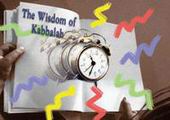We wish to thank everyone who sent their entries for the “Misconceptions of Kabbalah” competition. All the entries made it clear that everyone’s spiritual path is equally unique, and no entry could be decided to be more or less unique than another.
We will continue featuring various entries in the daily Kabbalah Blog posts (Click here to receive them in your e-mail) and in the newsletter (subscribe on the right of this screen).
The following entry, sent by David D. Garcia of New York, was chosen to receive the free copy of The Complete Idiot’s Guide to Kabbalah because it most closely fits the Jewish themes of this week’s newsletter and the new issue of Kabbalah Today.
WINNING COMPETITION ENTRY: As a Jew, my biggest misconception of Kabbalah before encountering Bnei Baruch was that I had to be fully ‘Torah Observant’ before being able study Kabbalah. I was always taught that one must have an extensive background in Torah and Talmud before even contemplating Kabbalah. I always accepted this because I had always assumed Kabbalah was ‘only for Jews’, and further, only for ‘observant’ Jews.
Once I learned through Bnei Baruch that it is essential for all people to study Kabbalah, this discovery made me begin to question my preconceived ideas of prerequisites to Kabbalah study. And it was through Bnei Baruch that I came to understand that Torah, and perhaps to a ‘lesser’ extent, Talmud, can only be properly understood through a Kabbalistic lens. This allowed me to dispel all my previously held ideas and begin to Kabbalah study in earnest. Thank you!
Myth: Kabbalah Is a Religion

FROM THE BOOK: This is a common misunderstanding, and one worth addressing from the start. The wisdom of Kabbalah is related to no other religion or belief. It does not deal with meditations, prophecies, questions of religion, or even one’s mental state. Religions, however, are combinations of rituals designed by humans to support them in their earthly existence. While religions such as Judaism and Christianity have similar concepts of the Upper World (heaven, the afterlife, etc.), much of religion teaches how humans should exist in this temporal world.
Kabbalah, however, is better thought of as a science, not a religion. As such, Kabbalah studies and provides a way of understanding of the essential core of humanity, the Higher World, the entire universe, and the Creator. The outcome of that study is the discovery that humankind wishes to become like the Creator. The wisdom of Kabbalah is the science of the system of creation and its management.
pp. 53/54 of The Complete Idiot’s Guide to Kabbalah, by Rav Michael Laitman, PhD and Collin Canright.
Click Here to Sign Up for a Free Kabbalah Introductory Course – Starts Soon!














